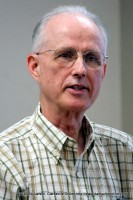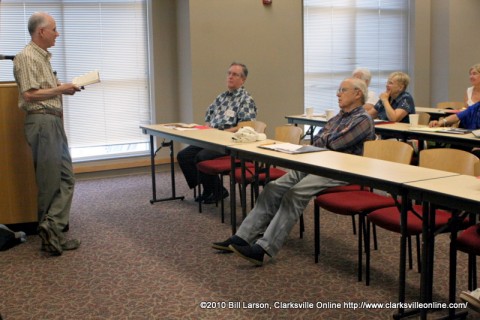
Born in Oklahoma City, Robert Love Taylor was introduced to jazz by a friend who took him to Ruby’s, a café where all the booths had earphones that sugared recorded jazz into your brain. Previously he had accompanied his classically trained coloratura girl friend to classical concerts, but jazz awoke a whole new side of Robert’s musical world.
During the formative years of his life, Robert Love Taylor studied accordion, saxophone, baritone saxophone, and pipe organ. He played not only in the school band but in a 16-piece dance band as well. In college, he majored in business until he hit accounting and then decided music would be a more suitable career for him.
In 1961, he dropped out of the University of Oklahoma to move to San Francisco to write poetry. It was the era of the “beat generation” and Robert didn’t’ want to be left behind. “I had read E.E. Cummings and thought to myself that this poetry gig looked easy, so I decided to give it a try,” he recalled at the Sixth Annual Clarksville Writers’ Conference. It was a time when many coffee houses featured poets and San Francisco had a radio station on Friday night that played jazz and the blues, he remembered.
He continued to take classes at San Francisco State College from 1961 to 1964.
“Eventually I went back to Oklahoma and got a Bachelor of Arts degree,” he said quietly. It was near Virginia Tech that he discovered a poster that touted “Fiddlers Convention Galax” and, after attending this mecca of bluegrass, his lifelong love of the fiddle was sealed.
“I began writing seriously in my late 20s,” he described, “but I always kept up with my music. My first published book was Love and Belle Starr, a series of stories about outlaws. Belle Starr was called the ‘bandit queen’ and she had a series of lovers. She lived in Robbers’ Cave where they had dances on top of a big flat rock. She had one lover who was a fiddler but a rival didn’t take kindly to him. The second one shot the fiddler dead one night while he was playing for a dance. They say that on nights of a full moon, you can hear the fiddler play on the top of that rock.”

Robert told his audience that he had always tried to make his prose sing. His father and uncles were all fiddlers so he was involved with music all his life.
Professor Taylor, who is Professor Emeritus and former Chair of the English Department at Bucknell University in Lewisburg, Pennsylvania, wrote a novel, Under the Double Eagle, for his master’s thesis at Ohio University in 1970, and the novel, The Memoirs of Ferlin Tussaud, for his Ph.D. there in 1972. In 1989, he won the Oklahoma Book Award for his novel The Lost Sister.
His stories have appeared in publications like Best American Short Stories, O. Henry Awards, Pushcart Prize, New Stories from the South and distinguished literary journals like The Southern Review, The Georgia Review, Hudson Review, Southwest Review, Iowa Review, Shenandoah, and Cimarron Review.
Former students at The University of Tennessee may remember Professor Taylor when he taught fiction and creative writing there in 1987-1988 while he was the National Faculty Exchange Visiting Professor.
A cousin of Tennessee-born and Pulitzer Prize-winning Peter Taylor (considered one of the finest of American short story writers), Robert Love Taylor continues the family writing tradition with Blind Singer Joe’s Blues, his latest novel set in Bristol (Tennessee/Virginia). Robert describes Hannah Ruth Bayless, the mother of Blind Joe, when seen first by his father, Dudley Crider. “I heard a choir of angels in your voice,” Dudley tells her as he sees her sitting on the front porch snapping beans. He takes her for a walk in the cemetery later that day and three days later she sneaks out of her house to marry him. She has a son, Joe, who is born blind.
In order to prepare for this novel, Robert read memoirs of blind people. “It all comes down to using your imagination,” he advised aspiring writers. He has Blind Joe describe how he learned about people by feeling of a tongue, teeth, lips, eyes, neck and hair. Joe says that eyes are last.
“To see is to understand,” Joe admits. “Hands bring me light.”

Blind Singer Joe’s Blues is a book full of musical language and uses some Appalachian phrases like “your momma was a musicianer” to bring these characters to life. Taylor’s rich dialogue paints a world most readers have never seen.
Now involved as a fiddler with the Buck Mountain Band (their CD is “Chicken in the Snowbank” and they play gigs like the Galax Fiddlers Convention), Robert Love Taylor always writes with music in his fiction.
“To get music into language, you have to read poetry,” he assured his audience. His fiction reveals a poet-musician-writer who has done just that.















